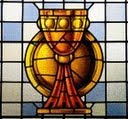.
image created at Wordle
It would be to waste the time of my readers and my ownif I strove to demonstrate how the general mediocrity of fortunes,the absence of superfluous wealth,*the universal desire for [material] comfort,and the constant effortsby which everyone [in the U.S.] attempts to procure it,make the taste for the usefulpredominate over the love of the beautiful in the heart of man.... They will habitually prefer the useful to the beautiful,and they will require that the beautiful should be useful.... The handicraftsmen of democratic agesendeavor not only to bring their useful productionswithin the reach of the whole community,but they strive to give to all their commodities attractive qualitieswhich they do not in reality possess.In the confusion of all ranks [meaning the relative social equality in the U.S. in comparison to European aristocratical nations during the 19th century]everyone hopes to appear what he is not,and makes great exertions to succeed in this object.This sentiment indeed,which is but too natural to the heart of man,does not originate in the democratic principle;but that principle [of democracy] applies it to material objects.To mimic virtue is of every age;but the hypocrisy of luxury belongs more particularlyto the ages of democracy.
~ Alexis de Tocqueville, Democracy in America, 1831
1831.
2010.
There is nothing new under the sun.
* Context: Recall that de Toqueville is comparing mid-19th century U.S. wealth to that of European aristocracies of the time.
.





No comments:
Post a Comment